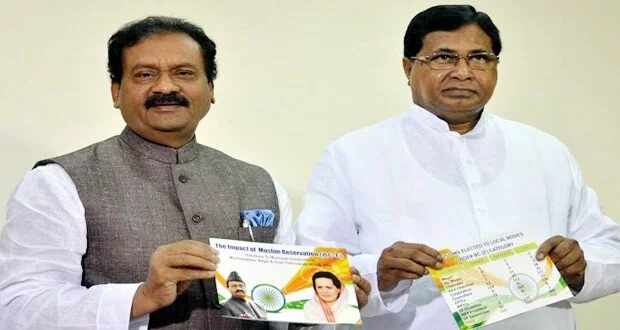Hyderabad, July 14 : For the first time ever, as many as 912 Muslims, categorised as BC-E, got elected to different posts in the recently held elections for municipal corporations, municipalities, nagar and gram panchayats in Telangana and Andhra Pradesh.
Releasing the statistics and analysis, Leader of the Opposition in Assembly K Jana Reddy and Deputy CLP leader in Council Mohammad Ali Shabbir claimed that the policy of Muslim reservation, introduced by the Congress Government in 2004, was responsible for the election of more than 900 Muslims on different posts. So far, due to BC (E) reservations three Muslims became Mayor, 5 Municipal Chairmen, 19 Vice-Chairmen, 2 ZP Chairmen, 2 MPP President, 37 Corporators, 327 Councillors, 15 ZPTCs, 236 MPTCs and 266 Sarpanches. They said that that it was the Congress Government which laid the foundation for educational, social, economic and political empowerment of Muslims by introducing 5 per cent reservation in 2004. Despite facing several obstacles, the Congress implemented Muslim reservation policy during its 10-year tenure and its benefits are still being enjoyed by the Muslim community, Jana Reddy said.
Shabbir Ali informed that the benefit of political reservation being given to BCs in municipal and other local bodies (rural and urban) was also extended to Muslims under BC (E) category for the first time in the last GHMC elections held in 2009. As a result, two Muslim candidates got elected from the seats reserved for BCs. Present GHMC Mayor Majid Hussain was elected from Ahmednagar, a division which was reserved for BCs.
“It was a great beginning and the first step towards political empowerment of the Muslim community. The major impact was seen in the Gram Panchayat elections held in 2013. The results were highly encouraging and for the first time in the history of Andhra Pradesh (undivided), the number of Muslim sarpanchas crossed double digit (266) due to BC (E) reservation. While 89 Muslims got elected from 8701 Gram Panchayats in Telangana region, as many as 177 Muslims were elected from 12,770 GPs in Andhra Pradesh (Seemandhra). This was a major leap in the political empowerment of Muslims due to BC (E) reservation,” he said.
In the recently held elections, Sk Abudul Azeez and Shaik Noorjahan became Mayaors of Nellore and Eluru respectively. Both were elected from the seats reserved for BCs. Similarly, five out of four Muslim municipal chairmen were elected from the BC reserved seats in Andhra Pradesh. Similarly, the lone Muslim Municipal Chairman of Telangana Sabiya Begum of Bhainsa was elected from BC (W) seat. Seven out of 12 Muslims elected as Vice-Chairman in Telangana and 11 out of 12 VCs in Andhra Pradesh won from the BC reserved seats.
The Muslim reservation played a major role in increasing the community’s representative in all the municipal bodies. For instance, 24 Muslim candidates got elected out 150 seats that went to polls in Karimnagar, Ramagundam and Nizamabad. Out of 24, as many as 13 were elected as BC (E). As against the present representation of 16%, the Muslim percentage in these corporations would have been just 7.33% without reservation. Similarly, 114 out of 206 Muslim councillors in Telangana were elected from BC reserved seats. Presently, their percentage in municipalities of Telangana is 14.72 which otherwise would have confined to 6.58%.
The impact of Muslim reservation is quite encouraging in Andhra Pradesh. Out of 31 Muslim corporators, 22 were elected from BC reserved seats. Similarly, out of 292 Muslim councillors, a whopping 213 were elected from BC reserved seats. The reservation policy benefitted the Muslims in ZPTC and MPTC elections. Presently, 11 out of 12 Muslim ZPTCs members in Andhra Pradesh and 4 out of 9 Muslim ZPTCs were elected due to their status of BC (E) candidates. Likewise, 163 out of 262 Muslim MPTCs were elected as BC (E) in Andhra Pradesh while 73 out of 138 MPTCs in Telangana were elected from BC reserved seats.
“These statistics are a proof of real empowerment of backward and poor Muslims. The Congress party has not gained anything out of this scheme, but it had sown the seeds of development for a community and now that tree has started giving fruits,” Shabbir Ali said. INN
 INN Live Urdu News Channel – India Breaking News, Headlines, Hyderabad اردو خبریں
INN Live Urdu News Channel – India Breaking News, Headlines, Hyderabad اردو خبریں


